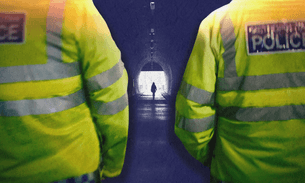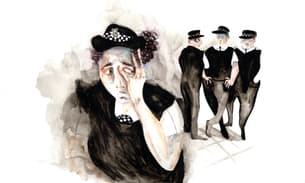
Police abuse victims let down by systemic weaknesses, say watchdogs
A new report has found “systemic weaknesses” in how police forces respond to domestic abuse committed by officers and staff.
The report, published today, is a response to a 2020 super-complaint filed by the Centre for Women’s Justice, based on reporting done by the Bureau of Investigative Journalism, accusing police forces across England and Wales of mishandling allegations of domestic abuse made against police officers and staff.
The joint response comes from the three major police watchdogs: the Independent Office for Police Conduct, the College of Policing, and Her Majesty’s Inspectorate of Constabulary and Fire & Rescue Services. The report, the most thorough review of police response to allegations of police-perpetrated domestic abuse (PPDA) to date, says there is a failure to consistently follow existing rules and victims are being left at risk of harm.
After reviewing specific case files, it concludes that the police forces involved were “not always doing enough to ensure all PPDA cases are properly and impartially investigated”.
These forces were also “found to not be doing enough to reassure victims” that their cases would be dealt with impartially and without corruption, collusion and abuse of police powers. Police failure to “consistently manage the extra risks and responsibilities” associated with PPDA cases is, according to the report, “creating and exacerbating poor outcomes for victims and the public”.
One particular failing noted was that specialist police, such as firearms officers, were less likely to be suspended because of staff shortages.
The report made a series of recommendations to the police and government, including to the Home Office, to help restore confidence in policing and audit past and ongoing cases.
Nogah Ofer, a solicitor at CWJ and author of the original super-complaint, welcomed the report but expressed disappointment that the recommendations “fall short of making the changes [the CWJ] believe are imperative to create a system that can foster trust and confidence for survivors and the public”.
The 2020 super complaint included harrowing testimonies from victims of abuse. Several women said officers and police staff had abused their power to intimidate them, threatening to throw them in jail if they reported the abuse, or convincing them they would not be believed by the perpetrator’s colleagues. Others reported investigative failings: one woman’s written statement to the police had been given to her husband, who was the suspect; another found out that the seals on her evidence bags had never been opened; several others said witnesses they named had never been contacted.
Lucy*, one of the 19 survivors originally cited in the complaint, told the Bureau that the findings were long overdue. “My goal in participating was to try and stop this from happening to other women in the future. If these recommendations are taken seriously and acted upon properly, he can be stopped from doing this again to someone else.
“But the key to that is putting the report recommendations into practice. So personally I'd like to see the Home Office acknowledge these findings and the ‘systemic weaknesses in policing’, and make a commitment to act.
“I was abused by one man, and let down by an entire police force. I don't want to be ignored by a whole government as well.”
The CWJ has been approached by about 165 other women alleging abuse since submitting the super complaint.
Earlier this week, the Metropolitan Police was placed into special measures after a litany of recent failings, including the murder of Sarah Everard by a serving police officer, the strip search of Child Q, and the stop and search of Bianca Williams.
Angela*, a serving Met police officer who suffered physical and sexual domestic abuse at the hands of a colleague, reported him after claims he had abused a second female officer. Despite this, the force decided he could continue working while the police’s investigation proceeded.
Responding to the report, she said: “Whilst a very validating read, a very difficult and sad one too. I became emotional seeing that it was not just me who felt alone, isolated, and felt like they must have been going ‘crazy’.
“Because of the police, my recovery will take years and it will take me a long time to trust the very force I serve again. I sincerely hope that they take this on board and make the changes necessary … It is sad that women have been saying this for so long, and it has taken this report to be heard.”
Angela’s case is not unique. In March, the Bureau of Investigative Journalism found 8 out of 10 police employees accused of domestic abuse were still working, based on Freedom of Information requests from 41 forces across the UK.
Roy Wilsher, Her Majesty’s Inspector of Constabulary, said: “This is an issue that has been overlooked nationally in the past. I hope our recommendations today will encourage forces to recognise the risk to integrity and public trust that these cases can cause, and act now to ensure they are providing the right support to victims.”
* Names changed for legal reasons
Header image: A stock image of police officers from behind. Credit: Getty Images.
Reporter: Sarah Haque
Additional reporting: Alexandra Heal
Editor: Meirion Jones
Production: Frankie Goodway
Fact checker: Chrissie Giles
Legal team: Stephen Shotnes (Simons Muirhead Burton)
This reporting was supported by core Bureau funds. None of our funders have any influence over our editorial decisions or output.
-
Area:
-
Subject:




